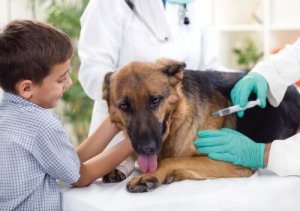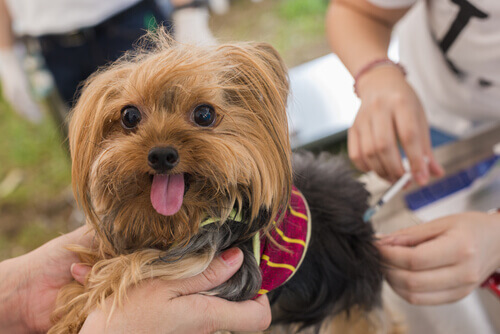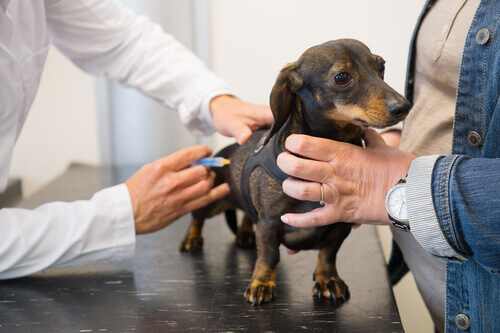6 Side Effects of Vaccinations in Dogs

While there is no denying that vaccinating your dog is essential if you want to prevent it from getting ill, they can suffer some mild side effects following these injections. In this article, we’ll tell you about some of the most common side effects of vaccinations in dogs.
Vaccinations and side effects
Making sure you get your dog vaccinated is a fundamental for ensuring good health and well-being. They prevent illnesses such as rabies, distemper and hepatitis (which can be fatal in dogs). Sometimes, however, you might notice your dog suffering some side effects in the hours or days following their vaccinations.
According to vets, these symptoms are the body’s reaction to the foreign agent in the vaccination.

It’s important to know that puppies are more likely to these suffer adverse effects than adult dogs. Small dog breeds and neutered animals are also more susceptible to these effects.
However, in most cases, there’s no need to worry about side effects. Vaccines have to be thoroughly tested to ensure that they are safe for our pets and effective in immunizing them against disease.
So, taking your pet to the vet for vaccinations is an important part of your duties as owner. The vet will give your pet a quick checkup to assess which vaccinations it needs and what dosage to give, depending on its health, age, and your geographic location.

The most common side effects of vaccinations in dogs
It’s important to understand that it’s perfectly normal for your dog to experience some side effects after receiving vaccinations. The most common include:
1. Drowsiness
It’s not uncommon for dogs to feel drowsy following vaccinations, and it might even fall asleep in the car on the way home. This is because they have been through a very stressful situation, and they need a little time to regain their energy.
2. Apathy
Another side effect of vaccinations has to do with their behavior towards their owner. The animal might become distant, as if it were angry with its owner for taking it somewhere so unpleasant. Mood swings and even aggressive behavior are not uncommon.
3. Inflammation
This is the most common side effect of vaccinations. A small bump may form in the area around the injection site. If your dog has pale skin, you might also notice it becoming red.
This happens because the liquid has not yet had time to travel around the body. Within the next few hours, it will return to normal. It can also be caused by a mild allergic reaction, a reaction to the needle or the alcohol that is used to disinfect the area.
4. Gastrointestinal problems
Some vaccinations can cause stomach pain, diarrhea, or vomiting in dogs. Your dog might go off its food, and lie on its side to take the pressure off its abdomen. The abdomen might also feel distended (swollen) to the touch.
5. Respiratory issues
A cough, sneezes and nasal excretions are common if your dog has been vaccinated intranasally. It might also develop a fever, or experience other flu-like symptoms, sleeping for several hours at a time, and not wanting to eat or move.
6. Anaphylaxis
Anaphylaxis is the most serious of all these side effects, so it’s important to look out for the warning signs. It can set in minutes or hours after the injection, and is characterized by swelling of the snout and throat, which stops it from being able to breathe properly. It can also cause a weak pulse, reddening of the skin, vomiting and diarrhea. However, this is a relatively rare side effect, so there’s no real need to worry.
In any case, a pet that has been recently vaccinated needs to be observed and monitored in the hours following the injection.
While there is no denying that vaccinating your dog is essential if you want to prevent it from getting ill, they can suffer some mild side effects following these injections. In this article, we’ll tell you about some of the most common side effects of vaccinations in dogs.
Vaccinations and side effects
Making sure you get your dog vaccinated is a fundamental for ensuring good health and well-being. They prevent illnesses such as rabies, distemper and hepatitis (which can be fatal in dogs). Sometimes, however, you might notice your dog suffering some side effects in the hours or days following their vaccinations.
According to vets, these symptoms are the body’s reaction to the foreign agent in the vaccination.

It’s important to know that puppies are more likely to these suffer adverse effects than adult dogs. Small dog breeds and neutered animals are also more susceptible to these effects.
However, in most cases, there’s no need to worry about side effects. Vaccines have to be thoroughly tested to ensure that they are safe for our pets and effective in immunizing them against disease.
So, taking your pet to the vet for vaccinations is an important part of your duties as owner. The vet will give your pet a quick checkup to assess which vaccinations it needs and what dosage to give, depending on its health, age, and your geographic location.

The most common side effects of vaccinations in dogs
It’s important to understand that it’s perfectly normal for your dog to experience some side effects after receiving vaccinations. The most common include:
1. Drowsiness
It’s not uncommon for dogs to feel drowsy following vaccinations, and it might even fall asleep in the car on the way home. This is because they have been through a very stressful situation, and they need a little time to regain their energy.
2. Apathy
Another side effect of vaccinations has to do with their behavior towards their owner. The animal might become distant, as if it were angry with its owner for taking it somewhere so unpleasant. Mood swings and even aggressive behavior are not uncommon.
3. Inflammation
This is the most common side effect of vaccinations. A small bump may form in the area around the injection site. If your dog has pale skin, you might also notice it becoming red.
This happens because the liquid has not yet had time to travel around the body. Within the next few hours, it will return to normal. It can also be caused by a mild allergic reaction, a reaction to the needle or the alcohol that is used to disinfect the area.
4. Gastrointestinal problems
Some vaccinations can cause stomach pain, diarrhea, or vomiting in dogs. Your dog might go off its food, and lie on its side to take the pressure off its abdomen. The abdomen might also feel distended (swollen) to the touch.
5. Respiratory issues
A cough, sneezes and nasal excretions are common if your dog has been vaccinated intranasally. It might also develop a fever, or experience other flu-like symptoms, sleeping for several hours at a time, and not wanting to eat or move.
6. Anaphylaxis
Anaphylaxis is the most serious of all these side effects, so it’s important to look out for the warning signs. It can set in minutes or hours after the injection, and is characterized by swelling of the snout and throat, which stops it from being able to breathe properly. It can also cause a weak pulse, reddening of the skin, vomiting and diarrhea. However, this is a relatively rare side effect, so there’s no real need to worry.
In any case, a pet that has been recently vaccinated needs to be observed and monitored in the hours following the injection.
All cited sources were thoroughly reviewed by our team to ensure their quality, reliability, currency, and validity. The bibliography of this article was considered reliable and of academic or scientific accuracy.
- Banet, M. A. N. U. E. L. (1986). Fever in mammals: is it beneficial?. The Yale journal of biology and medicine, 59(2), 117.
- Strasser, A., May, B., Teltscher, A., Wistrela, E., & Niedermüller, H. (2003). Immune modulation following immunization with polyvalent vaccines in dogs. Veterinary Immunology and Immunopathology, 94(3-4), 113-121.
- Phillips, T. R., Jensen, J. L., Rubino, M. J., Yang, W. C., & Schultz, R. D. (1989). Effects of vaccines on the canine immune system. Canadian Journal of Veterinary Research, 53(2), 154.
- HogenEsch, H., Thompson, S., Dunham, A., Ceddia, M., & Hayek, M. (2004). Effect of age on immune parameters and the immune response of dogs to vaccines: a cross-sectional study. Veterinary immunology and immunopathology, 97(1-2), 77-85.
This text is provided for informational purposes only and does not replace consultation with a professional. If in doubt, consult your specialist.








